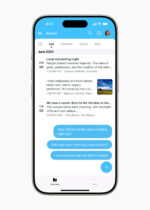The iPad 2 is a competent device, and on paper it did everything it needed to do to hold on as market leader. However, one of the first comparisons (from Digital Trends) between it and the Xoom showed the Xoom coming out on top, and this happened because Apple didn’t reset the bar for us.
That doesn’t happen very often. Apple typically enters any review, particularly after a big Steve Jobs launch, as the company to beat. But this time, not so much.
Since the launch, I’ve read a number of “Ten reasons to avoid the iPad 2″ pieces, which mostly seem to focus on what the iPad 3 might have, and even some pieces that tear down the iPad 2’s launch. One (from CNN) talks about all the things that Steve Jobs covered up about the iPad in terms of technologies left out, like Flash and 4G. Another (from Fortune) talks about how untruthful Jobs was.
For what seemed to me to be a decent launch, the coverage afterward would suggest that this is more like a train wreck. What happened?
Theory One: Steve Jobs hated the iPad 2
A key part to any Apple launch is Steve Jobs. There have been two products he launched that he clearly didn’t care for that much, and they didn’t do that well. There was the pudgy iPad Nano, with a big screen that he clearly didn’t like when he announced it (the “pudgy” name came from him); it was quickly replaced by a much sleeker product. Then there was Apple TV. (The Mac Mini falls into that class as well, even though it has become a favorite of many of us who wanted a PC-like product connected to a TV.)
If you watched Jobs during the iPad 2 presentation, the over-the-top comments made for the iPad 1—being magical, wonderful or fantastic—were either not there or dramatically muted. He likely had little to do with the decisions, and he might have preferred the company make better ones with regard to the cameras, wireless support and screen resolution. These were areas where the product missed expectations.
Theory Two: There is no tablet market
An awful lot of folks seem to be saying that they are putting their iPad down and going back to using a laptop, often a MacBook, but a laptop nonetheless. That happened a bit with netbooks, and the iPad is a netbook with a touch-screen, no keyboard, and more limitations.
I still have trouble figuring out why I should carry both, and an iPad, or any tablet, just can’t fully replace a notebook yet. The lack of Flash support and its disabling of many critical sites hurts particularly badly with the iPad right now, and the Web is a primary target for the product.
A little over a year ago, folks got really excited about the netbook too, and after one generation, that product is pretty much dead. The iPad is backed by Apple’s impressive marketing and it has had a great run, but what if the market is simply not that interested in it?
Theory Three: Bad timing
From Charlie Sheen to the Japan earthquake, the environment isn’t very good at the moment for any new device that isn’t associated with staying alive or avoiding buying gas. At the launch event, the fact that Jobs actually showed up seemed to eclipse the interest around the new tablet, suggesting that, at least this time, Steve himself was an additional distraction.
We don’t seem to be able to focus on a lot of things at once as a species, and we may simply be so distracted at the moment that we can’t sustain excitement for any device, no matter how good it is.
I do think we are getting close to something that could replace the PC, but the iPad likely isn’t it. It just doesn’t seem likely that we will ever be willing to carry three expensive connected devices. We are looking for a more compelling device that aggregates the others.
My idea of more compelling is closer to the device that Gene Roddenberry, creator of Star Trek, came up with for the television program “Earth: Final Conflict.” Called the Global Communicator, it was an iPod, iPhone and iPad in a single device, and it got there with a flexible outdoor viewable high-resolution color screen. That’s coming; the iPad may simply be the appetizer to get us ready for the arrival of a real Global Communicator.
Rob Enderle is a principal analyst at the Enderle Group.






